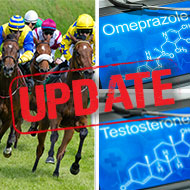BOVA UK issues statement on omeprazole concerns

BOVA Aus and BOVA UK have switched supplier for the excipient that was responsible for the traces of testosterone.
Drug company BOVA UK has issued a statement after testosterone was identified in a vial of its long-acting omeprazole injection in June.
Supply of the product ceased in Australia after the initial discovery by the New South Wales racing authority.
Samples tested by the British Horseracing Authority (BHA) confirmed the issue extended to the UK and the racing body recently advised against using injectible omeprazole in racehorses.
BOVA Aus and BOVA UK have carried out their own investigations and switched their supplier for the excipient that was responsible for the traces of testosterone. The company said all testing done on the new supplier has shown no traces of testosterone.
Independent testing
Nick Bova, managing director of BOVA UK, said: “We had no explanation for how contamination could have occurred at that time as we do not handle testosterone.
“The Omeprazole active pharmaceutical ingredient (API) is subject to ID testing on arrival at our licensed manufacturing facilities as well as material approval checks and compliance checks to set specifications in order to ensure that it complies with international standards.”
Through an independent testing process, it was revealed that one of the excipient raw ingredients contained testosterone at levels that are well within accepted international standards for impurities. Levels of testosterone found in the end product were confirmed by external laboratories to be 400-700 picograms per ml.
Supplier change
Mr Bova continued: “We have consulted veterinary pharmacologists and sports medicine specialists who have given their opinion that these levels are within accepted standards and could neither have a clinical effect nor result in a positive blood or urine test for testosterone in competition horses.
“The levels of testosterone within the product are inconsequential compared to endogenous production in mares and geldings as well as stallions and higher levels are found frequently in feed and water sources; testosterone being a common compound produced by humans and animals from multiple organs…
He added: “Although the level of impurities is well within the accepted international standard, we have changed the supplier of the excipient in question. We have established an analytical method capable of testing down to picogram levels, which has been used to test the end product to ensure there are no further concerns with future batches.”
“We sincerely apologise for any inconvenience this issue may have caused. Many vets and horse owners now rely on long acting injectable omeprazole for horses that do not respond to oral treatment and we can reassure anyone who has used the product in recent months, or has product that they are due to use, that they can do so safely. However, we would draw attention to the recent statement from the BHA that they do not wish the product to be used in horses in training currently.”



 The RCVS has announced a new version of its 1CPD mobile app, with enhanced features for veterinary surgeons and veterinary nurses to record their continuing professional development.
The RCVS has announced a new version of its 1CPD mobile app, with enhanced features for veterinary surgeons and veterinary nurses to record their continuing professional development.